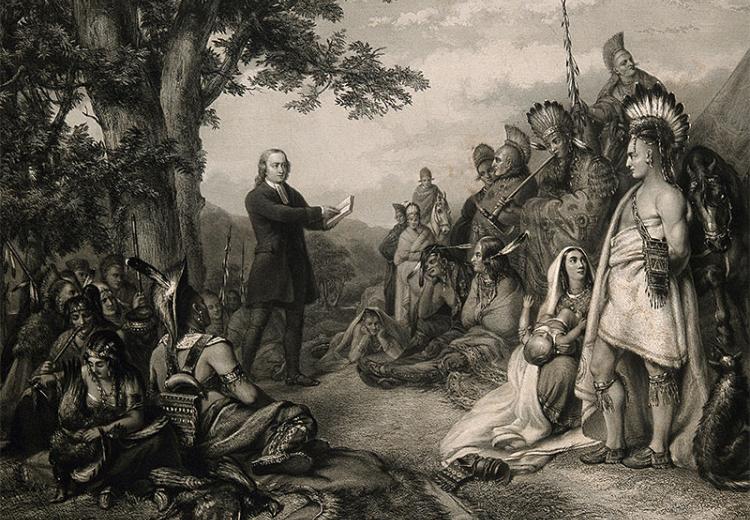Christianity in 18th Century America

John Wesley preaching to American Indians.
The traditional religions of Great Britain's North American colonies—Puritanism in New England and Anglicanism farther south—had difficulty maintaining their holds over the growing population. The main reason for this was that the frontier kept pushing further west, and the building of churches almost never kept up with this westward movement. This did not, however, result in a wholesale decline in religiosity among Americans. In fact, the most significant religious development of 18th century America took place along the frontier, in the form of the Great Awakening (often called the "First Great Awakening" to distinguish it from a similar movement that occurred in the first half of the 19th century).
The First Great Awakening was largely the work of itinerant preachers such as John Wesley and George Whitefield, who addressed huge audiences both in the major cities and in remote frontier villages. In contrast to the older faiths, these preachers preached a doctrine that deemphasized traditional church structure, ceremony, and even clergy. Relying heavily on emotional appeals, which remain a feature of modern-day "tent revivals," they stressed the importance of a personal relationship with God and of the responsibility to God that came along with it. This movement, thanks in particular to its ministry to those on the frontier, fundamentally changed the religious landscape of English America. Membership in the older, established sects such as Puritan Congregationalism and Anglicanism fell into decline, while the newer evangelical sects—Presbyterians in the North, Baptists and Methodists further south—surged in size and influence. By the time of the American Revolution a majority—perhaps as many as 80 percent of the population—identified with the new faiths.
The movement also had a powerful political dimension, particularly in the southern colonies. The Anglican faith had long nurtured the old ties between the colonies and the Mother Country. Baptists and Methodists, however, felt no such connection. Moreover, as the new sects emphasized personal belief and action over traditional church structures, they were less willing than their older counterparts to accept America's continued submission to Great Britain. As a result, scriptural defenses of the cause of independence could be heard coming from growing numbers of preachers throughout the colonies.
Of course, the new movement did not carry all before it. Traditional Anglicanism still remained powerful, particularly in the coastal cities of the southern colonies, and it was mainly from this sect that the Loyalist cause during the Revolution drew its strength. In addition, the First Great Awakening had little impact on sects such as the Quakers, who, as pacifists, refused to participate in the Revolution at all. Moreover, it should be noted that not all of the revolutionaries were driven by religious motives; such prominent patriots as Thomas Jefferson and Thomas Paine, for example, were deeply skeptical of all organized religion (although they certainly used scripture-based arguments), and had little but disdain for the emotional fervor of the evangelicals. Nevertheless the First Great Awakening had a dramatic effect on early America, not only altering its religious makeup, but helping to pave the way for the nation's independence.
This curriculum unit will, through the use of primary documents, introduce students to the First Great Awakening, as well as to the ways in which religious-based arguments were used both in support of and against the American Revolution.
Guiding Questions
What was the First Great Awakening and how did it affect religious belief in Colonial America?
How did religion affect arguments justifying American independence?
How did the leaders of the American Revolution employ religion to support the war effort?
How did different religions react to Revolution?
Learning Objectives
Identify when and where the First Great Awakening took place
Explain the characteristics of religious belief associated with the First Great Awakening
Identify and discuss the ideas of Jonathan Edwards, one of the leading preachers associated with the First Great Awakening
Discuss how colonial Americans perceived the First Great Awakening and how it affected the lives of both colonial Americans and Native Americans
Analyze Jonathan Mayhew's "A Discourse concerning Unlimited Submission and Non-Resistance to the Higher Powers" and discuss how this sermon served to support the revolution
Explain how Thomas Paine's Common Sense argues that the Bible does not support monarchy
Identify the references to a higher power in the Declaration of Independence and discuss why they might have been included
Discuss and analyze how the leaders of the American Revolution employed religion in the war effort
Explain the particular problem the Revolutionary War posed for Anglican clergy.
Discuss how Anglican "loyalists" reacted to the Revolutionary War.
Discuss and debate how General George Washington dealt with Quaker pacifism during the Revolutionary War.
